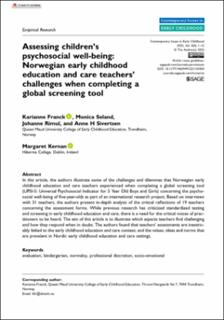Assessing children's psychosocial well-being: Norwegian early childhood education and care teachers’ challenges when completing a global screening tool
Peer reviewed, Journal article
Published version
Permanent lenke
https://hdl.handle.net/11250/3030101Utgivelsesdato
2022Metadata
Vis full innførselSamlinger
- Artikler (Articles) [173]
- Publikasjoner fra Cristin - DMMH [138]
Sammendrag
In this article, the authors illustrate some of the challenges and dilemmas that Norwegian early childhood education and care teachers experienced when completing a global screening tool (UPSI-5: Universal Psychosocial Indicator for 5 Year Old Boys and Girls) concerning the psychosocial well-being of five-year-olds as part of an international research project. Based on interviews with 31 teachers, the authors present in-depth analysis of the critical reflections of 19 teachers concerning the assessment forms. While previous research has criticized standardized testing and screening in early childhood education and care, there is a need for the critical voices of practitioners to be heard. The aim of this article is to illustrate which aspects teachers find challenging and how they respond when in doubt. The authors found that teachers’ assessments are inextricably linked to the early childhood education and care context, and the values, ideas and norms that are prevalent in Nordic early childhood education and care settings.

